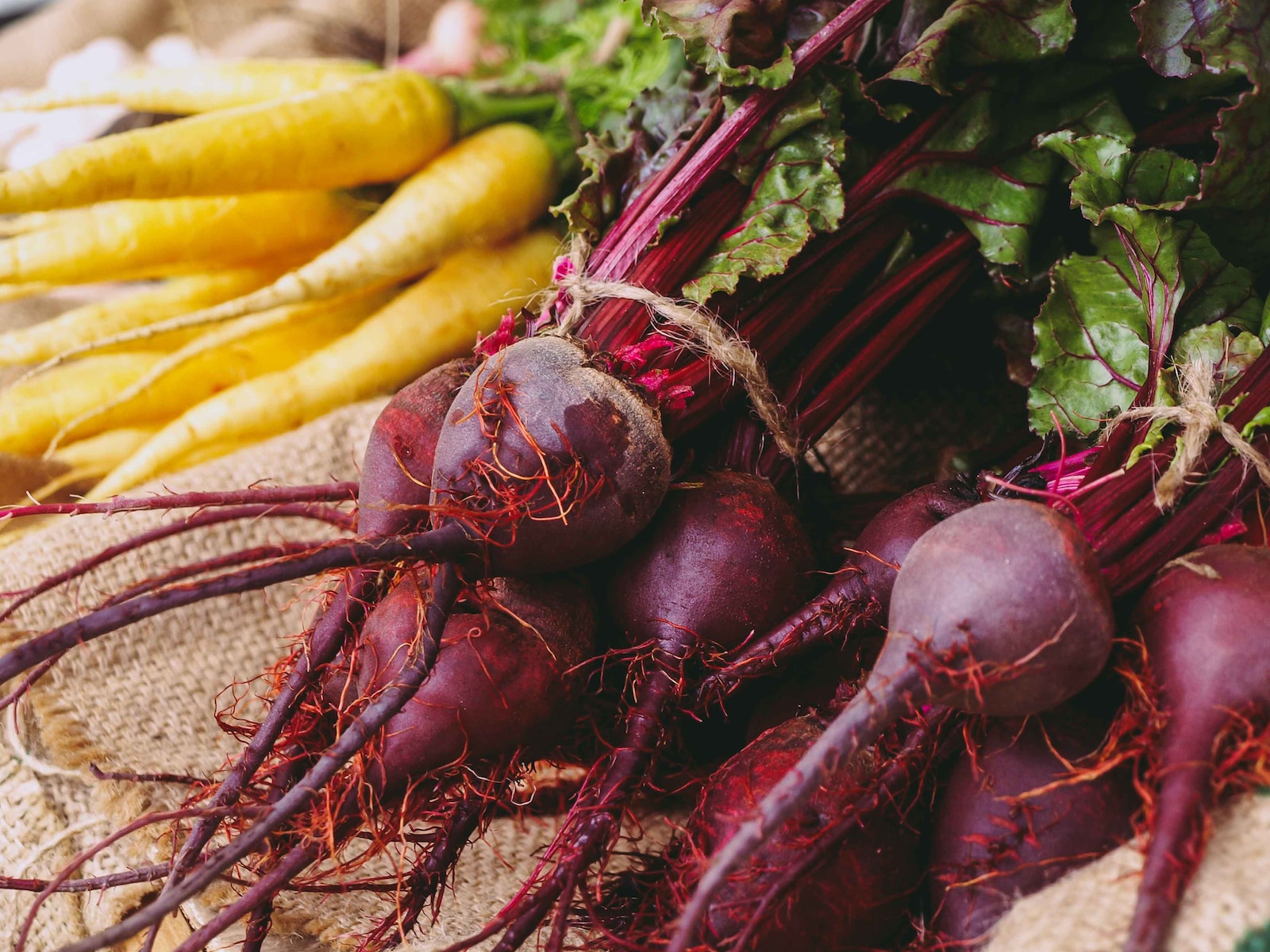CookingSubstitutes is a blog dedicated to exploring suitable alternatives in recipes, providing helpful how-to guides, and sharing mouthwatering recipes.
We're here to make your culinary adventures even more delightful!
10 Best Substitutes For Beets

Beets, or beetroots, are beloved for their unique flavor profile. They offer a delightful combination of earthiness, sweetness, and a hint of bitterness. Whether roasted, boiled, pickled, or blended into a vibrant beet soup, these root vegetables provide depth and color to various culinary creations.
However, there are times when you may need to find suitable substitutes for beets. This could be due to their seasonal availability or personal preference. Fortunately, several alternatives can lend similar qualities to your dishes. Let’s explore them in detail.
Beetroot Substitutes
Root vegetables are a great place to start when looking for substitutes for beets. They offer a similar texture and can contribute earthy flavors to your recipes. Here are some excellent options:
Carrots
Carrots are a popular root vegetable known for their vibrant orange color and natural sweetness. They can be grated, sliced, or diced to add a touch of color and crunch to your dishes. While they lack the distinct earthy flavor of beets, their sweetness can complement various recipes, including salads, stews, and roasted vegetable medleys.
Parsnips
With their pale cream-colored skin and sweet, nutty flavor, Parsnips can be a wonderful beet substitute. They become tender when cooked and can be roasted, sautéed, or pureed. Their unique taste adds depth to soups, purees, and roasted vegetable platters.
Sweet Potatoes
With their vibrant orange flesh and natural sweetness, sweet potatoes can be a fantastic substitute for beets. They offer a similar color and provide a delightful taste profile. You can use them in various forms, such as roasted cubes, mashed, or baked fries. Their versatility makes them great in savory and sweet recipes.
Turnips
Turnips are root vegetables with a mildly peppery and slightly sweet flavor. They come in various colors, including white, yellow, purple, and red. While they may not match the vibrant color of beets, they can still serve as a suitable substitute in terms of flavor and texture. Turnips can be cooked and used in various ways, such as roasting, boiling, or adding them to stews and soups. They bring a unique and slightly spicy taste to your dishes, making them an interesting alternative to beets.
Radishes
Radishes come in different varieties, including red, pink, white, and black. They have a crisp texture and a slightly peppery flavor. While they won’t provide the same sweetness as beets, they can offer a refreshing and vibrant addition to your recipes. Radishes are commonly used in salads but can also be pickled, roasted, or sautéed to enhance their flavor profile.
Leafy Greens for Color and Texture
Suppose you’re primarily looking to substitute the color and texture of beets in your dishes. In that case, leafy greens can be an excellent option. While they won’t provide the same flavor profile, they can add visual appeal and a nutritional boost to your recipes. Here are some leafy greens that can serve as alternatives to beets:
Swiss Chard
With its vibrant red or rainbow-colored stems and dark green leaves, Swiss chard can be a fantastic beet substitute. It offers a mild and slightly earthy taste. The stems can be sautéed or roasted, while the leaves can be used in salads, stir-fries, or as a bed for various dishes. Swiss chard adds color and provides a good dose of vitamins and minerals.
Red Cabbage
Red cabbage, with its deep purple color, can be an excellent substitute for beets in terms of visual impact. While it has a different taste profile, it can still add vibrant color to your dishes. Red cabbage can be shredded in salads, slaws, or stir-fries. It provides a satisfying crunch and contains antioxidants and nutrients.
Beet Greens
If you have access to beets but want to avoid using the root, you can use the beet greens as a substitute. Beet greens are the leafy tops of the beetroot and offer a slightly bitter and earthy flavor. They can be sautéed, steamed, or used in salads, adding a beet-like taste and texture to your dishes. Beet greens are also rich in vitamins and minerals, making them a healthy alternative.
Other Unique Alternatives
Beyond root vegetables and leafy greens, a few other unique alternatives can mimic certain qualities of beets in your recipes. Here are a couple of options:
Red Dragon Fruit
Red dragon fruit, or pitaya, is a tropical fruit with vibrant magenta or deep red flesh. While it doesn’t have the earthy flavor of beets, it can provide a visually striking element to your dishes. You can use red dragon fruit in smoothies, fruit salads, or even as a decorative garnish to add a pop of color and a hint of sweetness.
Hibiscus Flower
Hibiscus flowers are known for their deep red color and tart flavor. While they don’t resemble beets in texture or taste, they can be used to infuse a rich, red hue into beverages and desserts. Hibiscus tea, made by steeping dried hibiscus flowers, is popular for its vibrant color and tangy taste. You can also use hibiscus flowers to make syrups, jams, or jellies, adding an exotic touch to your culinary creations.
Remember, while these alternatives can provide similar visual elements or flavor profiles to beets, they won’t be an exact substitute in every aspect. Experimenting with different ingredients can lead to exciting and unique dishes that cater to your preferences and dietary needs. Enjoy exploring the world of culinary creativity!
FAQs
Yes, you can substitute beet juice for beets in a recipe. Beet juice can provide vibrant color and some flavor of beets in dishes. It can be used as a natural coloring agent or to add a hint of beet flavor to your recipes.
Beet substitutes may not provide the same nutritional profile as beets but can still offer health benefits. Many root vegetables like carrots, parsnips, sweet potatoes, turnips, or celeriac can be used as beet substitutes. While the nutritional content may vary, these substitutes are generally nutritious and contribute to a healthy diet.
Yes, you can use golden beets as a substitute for red beets. Golden beets have a similar earthy and slightly sweet flavor to red beets, although they lack a vibrant red color. However, they can still be used in recipes that call for beets to provide a similar taste and texture.
If you want to add sweetness to your dish without using beets, there are several alternatives you can consider. Some natural sweeteners include honey, maple syrup, agave nectar, or fruit juices like apple or orange juice. You can also use dried fruits, such as dates or raisins, to add a touch of sweetness. Experimenting with different sweeteners can help you achieve the desired flavor profile in your dish.
While beet substitutes may not offer the exact same health benefits as beets, many root vegetables used as substitutes are nutritious in their own right. Root vegetables like carrots, parsnips, and sweet potatoes are rich in vitamins, minerals, and dietary fiber. They can contribute to a well-rounded diet and provide various health benefits depending on nutrient profiles.
Conclusion
Remember to adjust the quantities and proportions of these substitutes based on the specific recipe you’re working with. Each alternative offers a different flavor profile and heat level, so experiment and taste to achieve the desired results.



